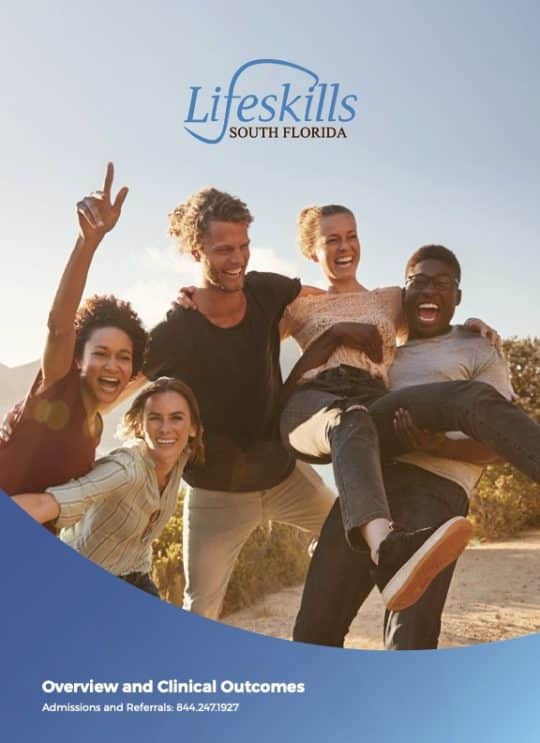2021 Clinical Outcomes and Key Findings
Home » Clinical Outcomes and Key Findings
Clinically Excellent Care Informed By Research and Training
Lifeskills has a comprehensive outcomes measurement approach that addresses the
clinical complexity of our clients. We are consistently adjusting our treatment programs
accordingly based on our outcomes. Lifeskills utilizes a variety of evaluation tools to inform
client care including:
- BASIS-24, which identifies a wide range of symptoms and problems that occur across the diagnostic spectrum.
- The Difficulties in Emotional Regulation Scale (DERS), which assesses the effectiveness of dialectical behavior therapy (DBT).
- The Drug Attitude Inventory (DAI-10), which demonstrates an individual’s positive endorsement of why they are taking their medication and adhering to the psychiatric protocol.
- The Brief Psychiatric Rating Scale (BPRS), which is a 24-item symptom scale used by clinicians to assess and measure psychiatric symptoms.
What Makes Lifeskills Different?
Dually Licensed
Lifeskills is one of the very few residential facilities in Florida dually licensed to provide treatment to individuals who present with either primary mental health or substance use disorders.

Fully Accredited
All levels of care are fully accredited by CARF and our transitional living services are certified by the Florida Association of Recovery Residences (FARR).

Clinical Expertise
Our treatment team includes a Quintuple-Board Certified Psychiatrist and licensed doctoral and master’s level clinicians with multiple certifications in their specialties.

Download a PDF Version of Our Report
2021 Client Demographics and Diagnoses
Patient Complexity
70.3% of clients had 2 or more co-occurring diagnoses confirmed at admission
Age
Primary Diagnosis
Secondary Diagnosis
Our top three secondary diagnoses were also mood disorders (including personality disorders and trauma), substance use disorder, and
thought disorders
2021 Outcomes
Throughout 2021, the COVID-19 pandemic continued to surge. Despite the challenges COVID-19 presented, clients at Lifeskills experienced significant reductions in negative symptoms across a wide range of diagnostic classifications using disease-specific tracks and rigorous COVID-19 safety protocols.
99% of Lifeskills clients use medication to help manage their mental health
disorders and 100% of clients on medication positively endorsed their
relationship with their medication.
According to the National Alliance on Mental Illness (NAMI), being medication compliant
is key to a sustained recovery.
0
%
Patients experienced a 35% average reduction in negative symptoms within the first 90 days of treatment.
To treat the 39% of Lifeskills clients with a primary or secondary substance use disorder, Lifeskills outperformed over 50k other substance abuse treatment centers in the country.
Lifeskills clients experienced a 49% reduction in substance abuse.
The National Comparison Group average was a 36% reduction in substance
abuse.
3-Year Longitudinal Results
In March 2020, we faced the onset of the global COVID-19 pandemic and successfully pivoted programming and our approach to care. Even faced with these difficulties, Lifeskills clients experienced significant reductions in negative symptoms across a wide range of diagnostic classifications using dedicated clinical pathways, while maintaining rigorous COVID-19 safety protocols.
From 2019 to 2021, Lifeskills clients had a 96% increase in positive feelings towards their prescription medications.
0
%
During this timeframe, Lifeskills clients experienced a 61% reduction in substance abuse symptoms.
Integrated treatment for individuals with co-occurring substance use disorder and a mental health disorder can improve outcomes and quality of life, according to the Substance Abuse and Mental Health Services Administration (SAMHSA).
0
%
Over the three-year period, our clients experienced a 48%
increase in emotional regulation skills through state-of-the-art dialectical behavior therapy (DBT) programming.
From 2019-2021, Lifeskills clients experienced a 73% reduction in self-harm, a 54% reduction in
suicidality, a 54% reduction in tension, a 53% reduction in depressive symptoms, and a 50%
reduction in psychosis.


